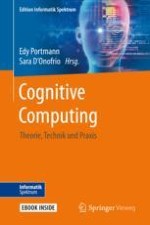2020 | OriginalPaper | Buchkapitel
Zur Grenze des Verstehens künstlicher Kreativität
verfasst von : Jan Sebastian Zipp
Erschienen in: Cognitive Computing
Verlag: Springer Fachmedien Wiesbaden
Aktivieren Sie unsere intelligente Suche, um passende Fachinhalte oder Patente zu finden.
Wählen Sie Textabschnitte aus um mit Künstlicher Intelligenz passenden Patente zu finden. powered by
Markieren Sie Textabschnitte, um KI-gestützt weitere passende Inhalte zu finden. powered by
